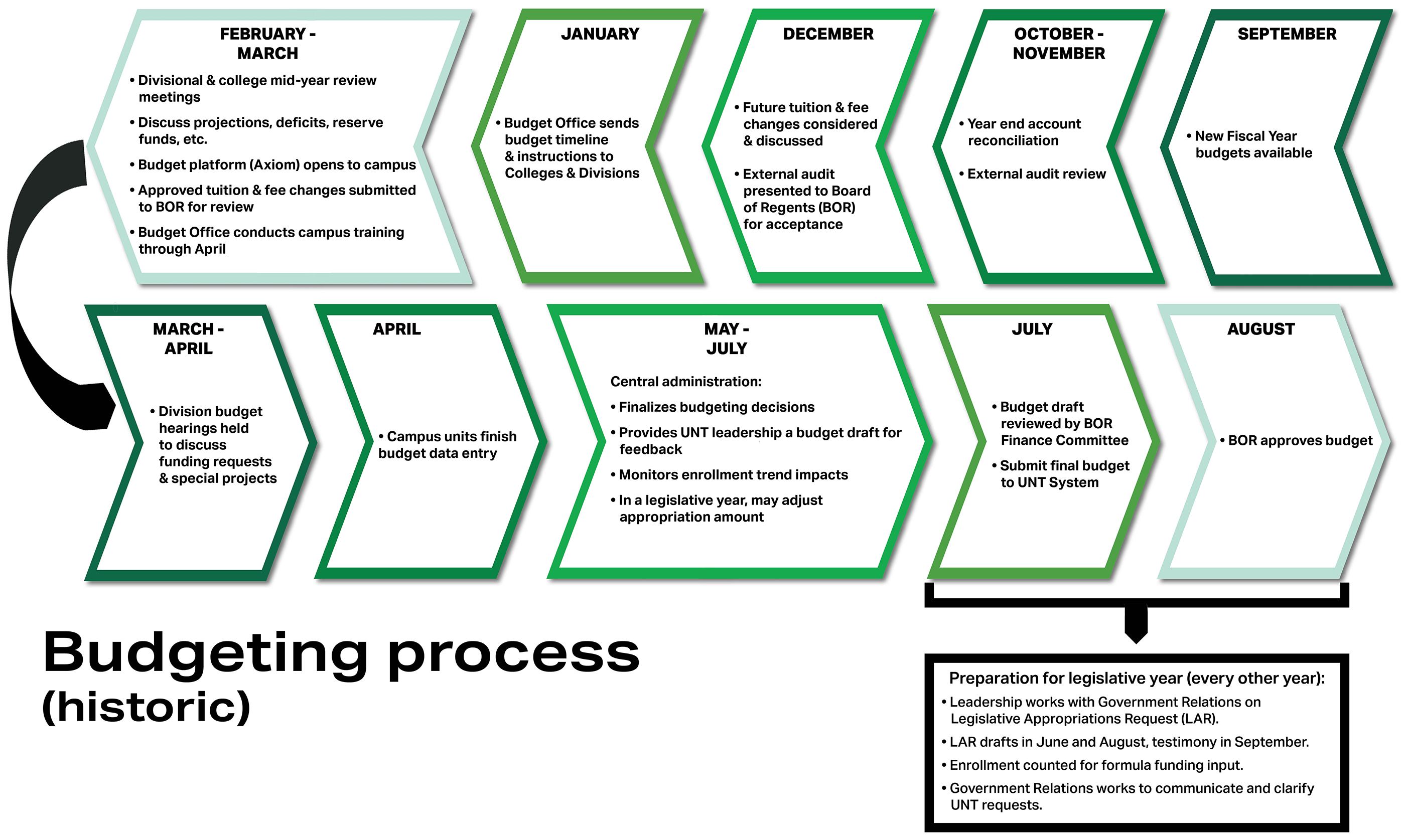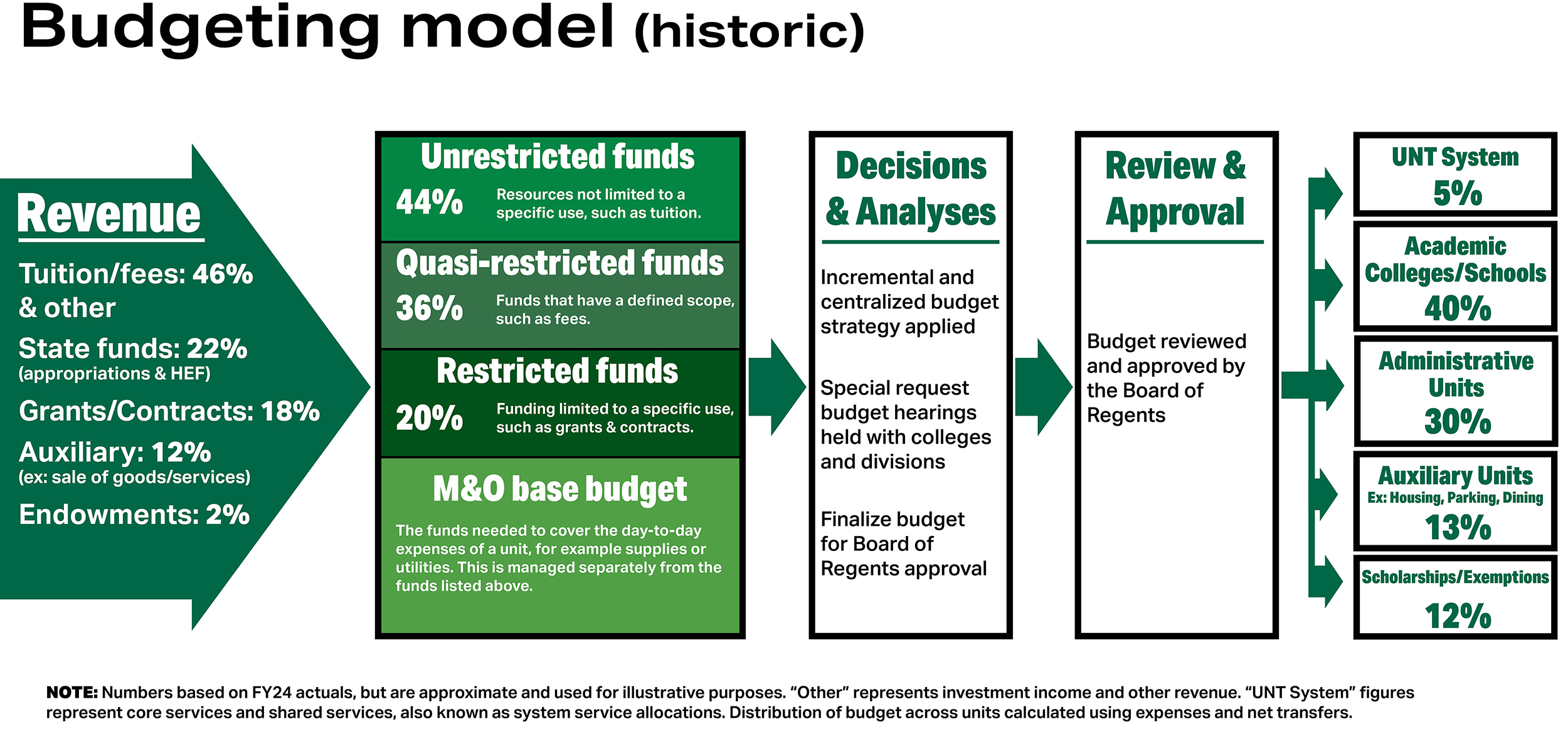Our Strategic Budgeting Journey
The Fall 2024 charge by President Keller to develop recommendations for a new budgeting
model at UNT included efforts and collaboration among students, faculty and staff.
This page serves to document our journey to show the steps taken in achieving this
goal.
Historic budgeting process and model
Prior to the establishment of a new budgeting process and model, UNT historically used a combination of incremental and centralized budgeting.
Incremental budgeting means budgets are based on the previous year’s funding with only new revenue being allocated each year. This also means that budget cuts, when needed, are typically made as a percentage of the total budget and often implemented across the board. This approach is easy to implement, but can be difficult to determine how expenditures relate to costs, revenues, and institutional priorities since the primary focus is maintaining a stable, steady budget.
Centralized budgeting creates a pool of revenue that allows university leaders to make decisions about distributions of funds. When used in combination with incremental budgeting, this model usually requires relatively few decisions. However, this approach may lead to confusion about how resource allocation decisions are made.
 The Historic Budgeting Timeline Process outlines the key phases in developing the university's budget. The process begins
in September, when budgets for the new fiscal year become available. As illustrated
in the accompanying image, the bulk of the budgeting activity occurs between February
and March, with additional critical steps in May and throughout the summer. Special
considerations are made in July and August in advance of the Texas Legislature’s biennial
session.
The Historic Budgeting Timeline Process outlines the key phases in developing the university's budget. The process begins
in September, when budgets for the new fiscal year become available. As illustrated
in the accompanying image, the bulk of the budgeting activity occurs between February
and March, with additional critical steps in May and throughout the summer. Special
considerations are made in July and August in advance of the Texas Legislature’s biennial
session.
Download a detailed and readable PDF version of the timeline.
 The Historic Budgeting Model illustrates how revenue flows through the budgeting process and is allocated. As
depicted in the image, certain revenues are earmarked for specific purposes, while
the Maintenance & Operations (M&O) base budget is essential for ensuring that university
units can cover fundamental expenses. Decisions related to supplemental funding are
addressed here, with further details provided in the Budgeting Timeline Process.
The Historic Budgeting Model illustrates how revenue flows through the budgeting process and is allocated. As
depicted in the image, certain revenues are earmarked for specific purposes, while
the Maintenance & Operations (M&O) base budget is essential for ensuring that university
units can cover fundamental expenses. Decisions related to supplemental funding are
addressed here, with further details provided in the Budgeting Timeline Process.
Download a detailed and readable PDF version of the budgeting model.
Guiding principles
The new budgeting model and process for the University of North Texas advances the mission, values, and strategic priorities for the university. As we continue this important work, we keep in mind the following guiding principles that were established when the university undertook the initiative to create a new model and process.
Transparency and Prioritization
- Encourage open communication about available resources, and enable the ability of regular reporting by colleges, schools, and units
- Align unit-level budgeting with UNT's strategic priorities
- Ensure relevant stakeholders have access to necessary information and reports
- Provide budget guidelines and formulas that offer consistent, predictable support
- Develop an auditing timeline that supports financial integrity
Community-Centered
- Student Success: Prioritize budget allocations that directly support student success, while also supporting faculty and staff efforts to improve student success
- Faculty Success: Support and encourage faculty-led research, innovation, and creative contributions
- Staff Success: Focus the budgeting process to incentivize, strengthen, and support operational effectiveness and efficiency
Strategic Outlook
- Support strategic forecasting, analysis, and data-driven decision making
- Strengthen activities aligned with university strategic priorities
- Provide guidance for current and future goals
Innovation and Entrepreneurship
- Encourage innovation that adds to revenue or improves institutional efficiency and productivity
- Facilitate mission-specific resource allocation
- Foster a culture of entrepreneurship and mentorship
Flexibility and Adaptability
- Provides for adjustments in budget allocations or priorities that are adaptable to new opportunities and challenges
- Facilitate contingency planning
Collaboration and Partnership
- Encourage cross-unit and interdisciplinary collaboration
- Encourage external partnerships that generate revenue or enhance educational and research excellence
Ethical and Responsible Spending
-
Prioritize excellence and enhance reputational areas of significance
-
Consider the social and ethical implications of budget decisions
Initial committees
Creating a new budgeting model to advance the mission, values, and strategic priorities for the university required collaboration among students, faculty, and staff. The executive sponsor committee created two committees to contribute to this work: the Technical Committee, which researched best practices and gathered data; and the Steering Committee, which combined feedback from the UNT community with the information provided by the Technical Committee to create a proposal for the new budgeting process and model. Each committee included members from key areas across the university. The Implementation Committee began its work in Spring 2025 to assist with the first application of the new model and process.
Executive sponsors establish priorities, provide general guidance to the committees, consider recommendations and input received from the committees and campus community, and make final decisions about the new budgeting model.
Members
-
Dr. Harrison Keller, President
-
Dr. Mike McPherson, Provost
-
Clayton Gibson, Vice President for Finance and Administration
Comprised of student, faculty, and staff members, the Steering Committee will work together to consider how various models might work at UNT, invite input from across the campus, and recommend elements for a new strategic budgeting model.
Members
-
Dr. Albert Bimper, Executive Dean of the College of Liberal Arts and Social Sciences and chair of the Steering Committee
-
Danny Armitage, Associate Vice President of Auxiliary Services
-
Dr. Robert Bland, Professor of Public Administration
- Dr. Diane Bruxvoort, Dean of University Libraries
-
Brandon Buzbee, Vice President for University Advancement
- Coby Condrey, Associate Librarian
-
Alfred Dozier, President of Student Government Association
-
Chris Foster, Associate Vice President of Student Accounting and liaison for the Technical Committee
- Clayton Gibson, Vice President for Finance & Administration and liaison for the Executive Sponsor Committee
-
Shannon Goodman, Vice President of Enrollment
-
Dr. Karen Hutzel, Dean of the College of Visual Arts and Design
-
Walter Itoman, Associate Vice President of University Budget and Analytics
-
Jeffery Kam, Accounting Coordinator for UNT Union
-
Bala Sankar Kilaru, President of Graduate Student Council
- Dr. Paul Krueger, Dean of the College of Engineering
-
Jared Mosley, Vice President of Athletics and Director of Athletics
-
Dr. Pam Padilla, Vice President for Research and Innovation
-
Dr. Audhesh Paswan, Vice Provost of UNT at Frisco and Dean of the College of Applied and Collaborative Studies
-
Dr. Lou Pelton, Professor of Marketing
-
Dr. John Puthenpurackal, Associate Dean for Ryan College of Business
-
Dr. John Quintanilla, Dean of the College of Science
-
Maleia Torres, Associate Vice Chancellor of Treasury for UNT System
-
Margarita Venegas, Senior Communications Strategist for the Division of Finance and Administration
-
Dr. Marilyn Wiley, Dean of the Ryan College of Business
-
Dr. Kim Williams, Chair and Professor of Hospitality and Tourism Management
-
Dr. Elizabeth With, Senior Vice President of Student Affairs
Technical Committee members will evaluate the budgeting practices and methods used by other institutions and test the implications of new approaches to budgeting for UNT.
Members
-
Kassie Grubbs, Senior Director for Division Budget and Operations in Student Affairs and Chair of the Technical Committee
-
Tom Augsburger, Director of Division Budget and Operations for Advancement
-
Kathy Burmeister, Director of Division Budget and Operations for University Brand Strategy and Communications
- Candice Eddington, Senior Director of Division Budget and Operations for Enrollment
-
Brandi Everett, Vice Provost for Academic Resources
-
Rafiu Fashina, Associate Vice President and UNT Controller
-
Chris Foster, Associate Vice President of Student Accounting
-
Jim Gross, Assistant Vice Chancellor of Financial Planning and Analysis for UNT System
-
Linda McKeiver, Director of Division Budget and Operations for UNT at Frisco
-
Alison McMillan, Budget Manager for University Budget and Analytics
-
Ashtin Preston, Director of Analytical Information Solutions
-
Chad Ramsey, Budget Director for University Budget and Analytics
-
Shannon Rowland, Director of Division Budget and Operations for Digital Strategy and Innovation
-
Victoria Smith, Director of Division Budget and Operations for Research and Innovation
-
Matt Witty, Executive Senior Associate Athletic Director
Implementation Committee members reside over implementation of the new strategic budget model during Spring and Summer 2025. Beyond this period, there will be a similar committee (if not the same) that meets at some cadence in FY26 each semester to review model feedback, unintended consequences, and suggestions for improvement.
Members
- Danny Armitage, Associate Vice President, Auxiliary Services
- Dr. Albert Bimper, Executive Dean of the College of Liberal Arts and Social Sciences and chair of the Steering Committee
- Dr. Nicole Dash, Dean, College of Health and Public Service
- Clayton Gibson, Vice President for Finance and Adminstration
- Shannon Goodman, Vice President for Enrollment
- Dr. Karen Hutzel, Dean, College of Visual Arts and Design
- Dr. Paul Krueger, Dean, College of Engineering
- Jeffery Kam, Treasurer, Staff Senate
- Dr. Pam Padilla, Vice President for Research and Innovation
- Lou Pelton, Faculty Senate Budget Committee Chair
Support Personnel
- Water Itoman, Associate Vice President, Budget and Analytics
- Margarita Venegas, Senior Communications Strategist, Finance and Adminstration
Community participation
Comments from sessions with students, faculty and staff were grouped into categories to give our community an overview of what was listed as the most important topics at UNT. This feedback has been shared with the Steering Committee to help inform them when choosing a new budget model. This feedback serves as a helpful guide throughout the implementation of the new budget model.
Please note that the meetings below were advertised to specific staff/faculty groups with the caveat that any UNT student, faculty or staff member could attend the session that worked for their schedule. Therefore, each session includes feedback from a variety of campus community members.
- Staff supervisors and budget decision makers discussion group on Nov. 5. Download a PDF of key feedback.
- Faculty chairs, leadership and budget decision makers discussion group on Nov. 6. Download a PDF of key feedback.
- General faculty discussion group on Nov. 8. Download a PDF of key feedback.
- General staff discussion group on Nov. 12. Download a PDF of key feedback.
Feedback and questions can be directed to the Strategic Budgeting Steering Committee at any time by filling out this form. It has been updated to include the questions that were asked during the discussion group sessions above.